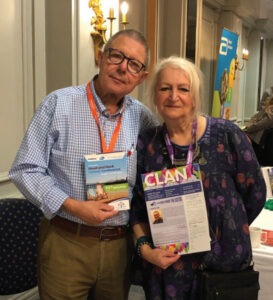Things Don’t Always Go to Plan!
Looking back on my cancer journey, there were several times events took a course I had been determined to avoid.
 I was working as a secondary school teacher and noticed some problems with my voice. Eventually, after an examination at my local hospital, I was diagnosed with cancer of the larynx. My awareness of laryngectomees was confined to seeing a few individuals struggling to communicate with an electrolarynx in a supermarket or around town. I could not imagine living like that!
I was working as a secondary school teacher and noticed some problems with my voice. Eventually, after an examination at my local hospital, I was diagnosed with cancer of the larynx. My awareness of laryngectomees was confined to seeing a few individuals struggling to communicate with an electrolarynx in a supermarket or around town. I could not imagine living like that!
The cancer was stage 2 so I was happy to agree to 6 weeks of radiotherapy which went well. However after 6 months or so it was clear things were not right, the cancer was back. I had 3 choices: a total laryngectomy, a partial laryngectomy or to wait for the fat lady to start singing. Despite my earlier reservations about a laryngectomy, after a few days reflection, I opted for the total removal of my voice box. I believed it gave me the best chance of getting rid of the cancer and 20 years later it looks like one of my better decisions.
At this time I had been using the internet for several years so found lots of information, especially from the Webwhispers site in the USA. It raised my awareness of surgical voice restoration and I was very keen to use a voice prosthesis. My consultant, Mr V R Talati, was a star! He agreed to carry out his first primary puncture, meaning I should be able to speak soon after the operation. A few weeks later it was clear there were a couple of complications. Changing the valve was difficult and I could not manage it myself. Also, when using valve speech, the pressure produced broke the seal on the baseplate, which needed to be replaced.
In my time away from work I developed some new skills and even earned some money in computer database development. After around 10 months I had to make a decision, either to follow a new path or go back to teaching. My valve speech was not good enough for teaching, you can’t leave a group of 15 year olds on their own whilst going out to change a baseplate. The electrolarynx saved the situation. I could speak with a high volume and it only failed when the battery expired, a problem resolvable in 30 seconds.
So now I am exactly where I did not want to be 20 years previously, a laryngectomee using an electrolarynx to speak. I did not realise then that the outcomes of head and neck cancer treatment could be so diverse. That the electrolarynx is my best method of speech is not down to me, rather it is a result of extent of the surgery carried out and what tissue remains.
When out and about, using an electrolarynx attracts attention, especially from children who are puzzled by what they have seen and heard. Occasionally I take the trouble to explain my situation. When I went back into the classroom, I can count on the fingers of one hand the times when there was a negative reaction to my speech. It is so sad when I hear of patients with no other viable method of speech who will not use an electrolarynx because of the reaction they anticipate they will receive.
Malcolm Babb
Tale of a Survivor
Seven years ago, I thought I was a goner, diagnosed with a large tumour in my throat-finding it difficult to swallow, breath or even talk.
 The doc said I had a virus and prescribed antibiotics but after insisting there was something very wrong (well it was the wife who insisted really after all being a man, I just went along with anything) I finally got to see a H&N specialist who tried to get a camera up my nose and couldn’t. So, with the fateful words ringing in my ears, he said he needed to talk to the head honcho who also tried and failed.
The doc said I had a virus and prescribed antibiotics but after insisting there was something very wrong (well it was the wife who insisted really after all being a man, I just went along with anything) I finally got to see a H&N specialist who tried to get a camera up my nose and couldn’t. So, with the fateful words ringing in my ears, he said he needed to talk to the head honcho who also tried and failed.
So very quickly I was admitted into day surgery for a scan while I was anesthetised. My wife had been told to come back in a couple of hours (and so she promptly went shopping knowing I would be unconscious and not able to stop her!) On her return she was told I was in intensive care and the drama begins to unfold.
On waking up I found loads of plumbing sticking out of my neck in a ward full of bleeping and whirring machines and my dear wife holding my hand. Pretty scary stuff (the plumbing and machines, not the wife…although…)
Doctor came round and we had a conflab as to what was wrong. It turns out they found a very large chondro-sarcoma in my larynx I was concerned in that I was unsure what that meant and asked the Doc the dreaded question “is this cancer?” the Doc nodded and from then on, I went deaf and thank goodness my good lady took over.
Apparently, it was a rare sarcoma not normally found in the throat. It would require surgery that may or may not require various things removing, pulling up? Or replacing that I don’t even want to think of or repeat. Because it was so rare it needed specialists from around the world (so they said, I just think my surgeon was working up a name for himself!) to discuss and formulate a plan of action. In the end and after 3 months in hospital came the day for removal and I can honestly say I never felt a thing! It was successfully removed, and a speech valve inserted. Bit sore for a couple of days, passed my swallow test and they sent me home.
So, 7 years later and Trev’s still here, life is a bit different but it’s all manageable. I can honestly say that it does get better over time and thank goodness for my missus to make it just that little bit easier. There is lots of help and advice out there with NALC being top of my list. All you have to do is ask (no pun intended).
Trevor Hutson
